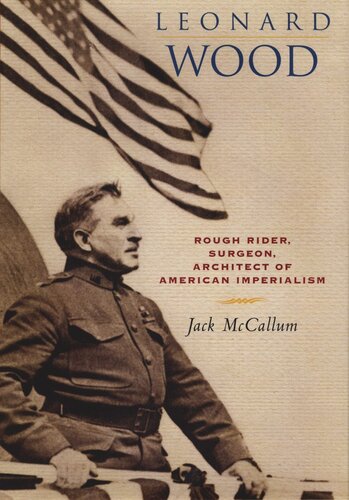

Most ebook files are in PDF format, so you can easily read them using various software such as Foxit Reader or directly on the Google Chrome browser.
Some ebook files are released by publishers in other formats such as .awz, .mobi, .epub, .fb2, etc. You may need to install specific software to read these formats on mobile/PC, such as Calibre.
Please read the tutorial at this link: https://ebookbell.com/faq
We offer FREE conversion to the popular formats you request; however, this may take some time. Therefore, right after payment, please email us, and we will try to provide the service as quickly as possible.
For some exceptional file formats or broken links (if any), please refrain from opening any disputes. Instead, email us first, and we will try to assist within a maximum of 6 hours.
EbookBell Team

0.0
0 reviewsOne of the most fascinating but least remembered figures in modern American history, Major General Leonard Wood (1860-1927) was, with his close friend Theodore Roosevelt, an icon of U.S. imperialism as the nation evolved into a global power at the dawn of the twentieth century. The myriad of roles that Wood played in his extraordinary career offer a mirror image of the country's expansion from the urban Northeast to the western frontier to Latin America and the Far East. Boston surgeon, Indian fighter, U.S. Army Chief of Staff, Medal of Honor winner, commander of the Rough Riders in the Spanish-American War, Governor General of the Philippines, and presidential candidate, Wood was one of a select cadre of men that transformed the American military at the turn of the century, turning it into a modern fighting force and the nation into a world power.
Throughout his life, Wood tested the division between military and civilian power to its very limits. His 1920 presidential campaign and his conflicts with civilian politicians were harbingers of the struggles that Generals Douglas MacArthur and Dwight D. Eisenhower would face as they moved from the battlefield to Washington following World War II.
Jack McCallum has mined Wood's extensive personal records—including diaries, correspondence, and photographs—to create a vivid portrait of a complex man and the legacy he left on U.S. imperialism. America's rapid conquest of Cuba and the Philippines and the subsequent political and economic reconstruction it imposed under Wood's military supervision in these regions have important parallels to current U.S. involvement in the Middle East, both in its successes and its failures.